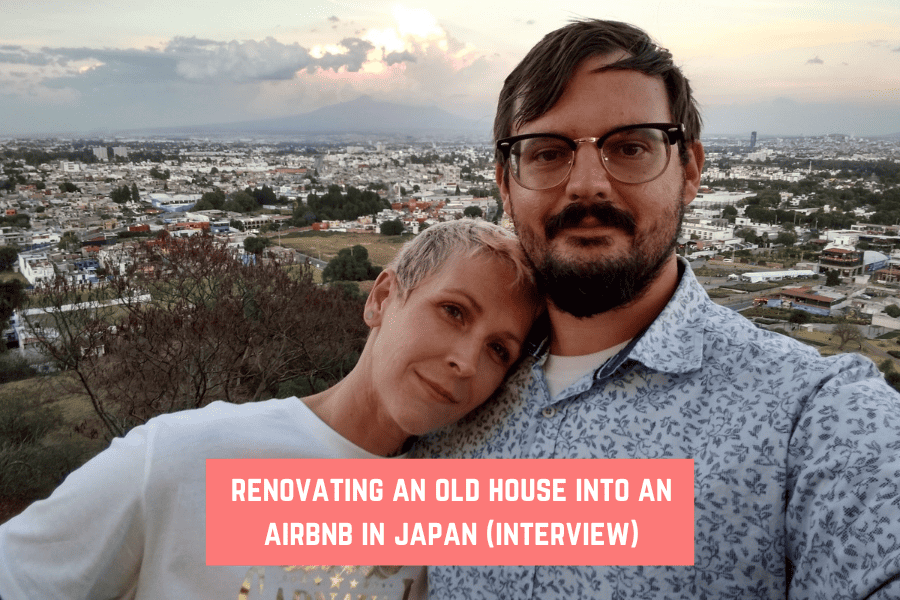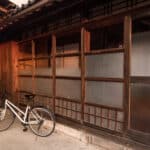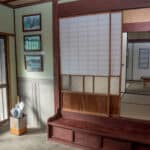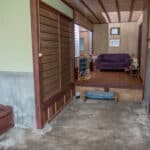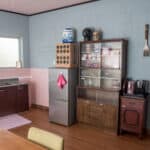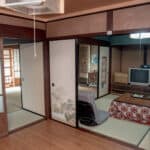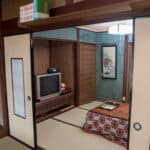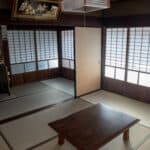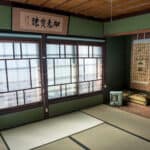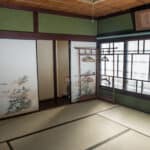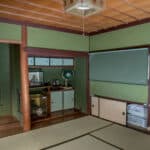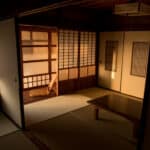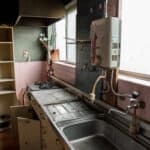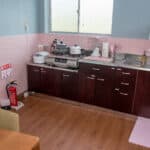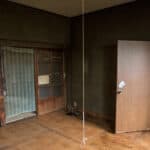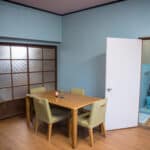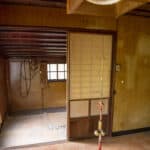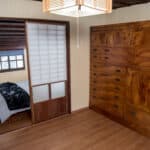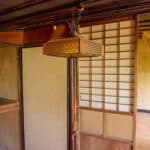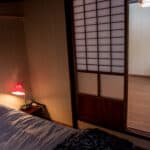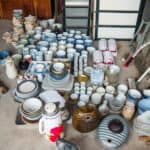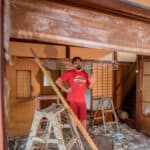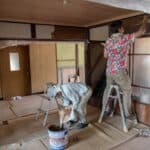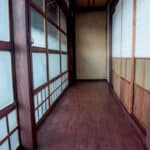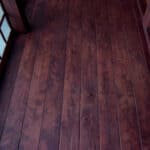Dani and Evan, after living on an urban farm in New Orleans, moved to rural Japan to pursue hobbies like beekeeping and farming. They bought two akiya houses on Ōmishima island for their guesthouse and future home, attracted by the mild climate and tourism potential. Renovations were completed quickly despite challenges like time constraints and many others. They were now sharing their experiences to help others pursue similar dreams.
*All the photos on this page are of the houses Dani & Evan brought.
Would you mind quickly introducing yourself to our readers? How long have you lived in Japan and what brought you there originally?
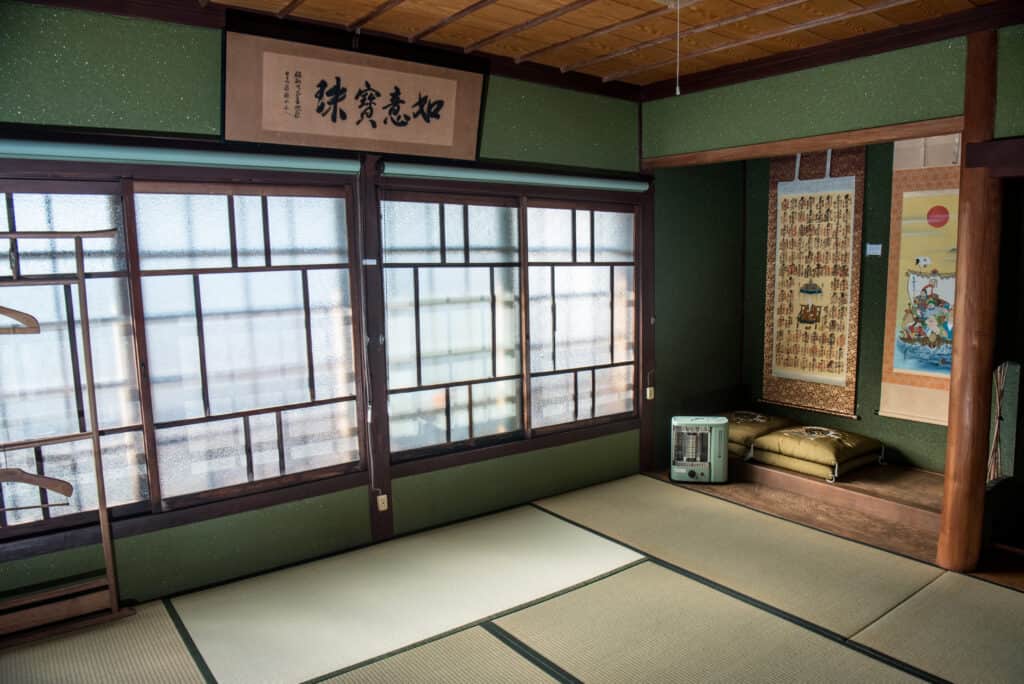
“We wanted to find a place to rebuild and expand upon our hobbies and small businesses: honeybees, small-scale farming, photography, and AirBnB”
Where is your house? Why did you choose that location?
Dani and Evan: We bought our two houses on Ōmishima island. This location was ideal for many reasons: The Startup visa is a relatively new program not available nationwide, so Imabari was high on our list. Also, Dani has an aversion to cold weather, and this area met her climate requirement for mild winters; the island is known for growing many varieties of citrus, and it warms her heart to see banana plants and kiwis growing.
Another important aspect is tourism. Ōmishima island is rural, but attracts many visitors. It’s part of an archipelago known for the ‘Shimanami Kaido’, a series of seven white suspension bridges spanning the Seto Sea from Hiroshima prefecture to Ehime prefecture. Cyclists travel here from all over the world to ride their bikes across the beautiful bridges with calm inland sea views. So we’re really in a perfect location to catch tourists who may want to stay in our guesthouse, pick up some ‘omiyage’ honey jars, or bring home some portraits to commemorate their travels.
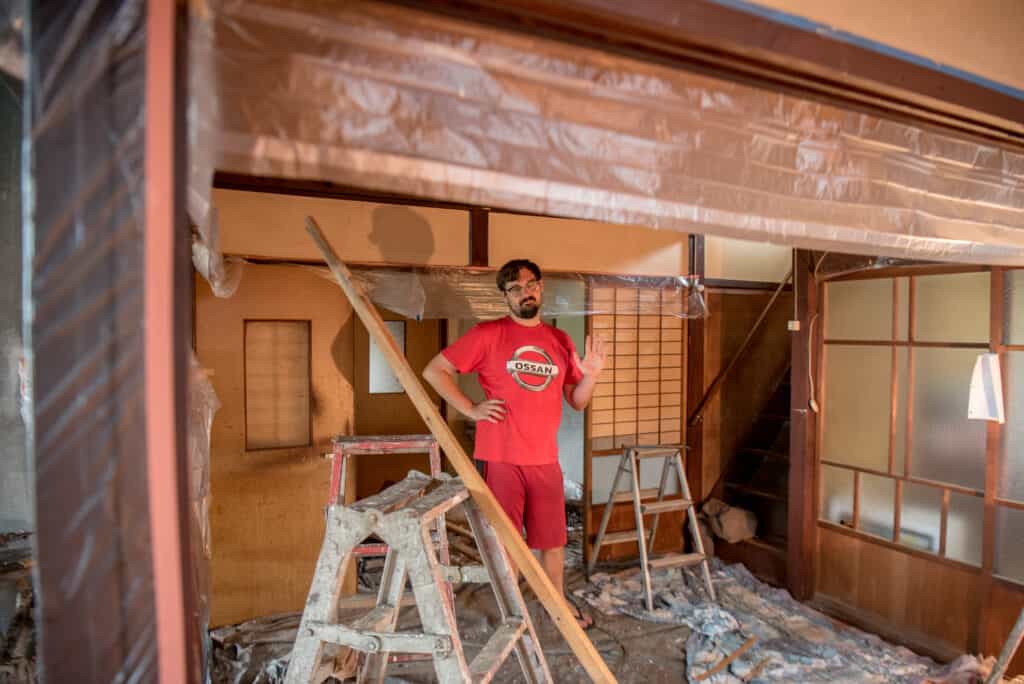
“Ōmishima island is rural, but attracts many visitors. It’s part of an archipelago known for the ‘Shimanami Kaido’, a series of seven white suspension bridges spanning the Seto Sea from Hiroshima prefecture to Ehime prefecture. “
What was the most difficult thing about the buying process? Was there anything surprising?
Dani and Evan: The buying process was relatively straightforward. We purchased the first house while we were in Japan as tourists, and the second after receiving residency. The paperwork was identical both times, except for one document. When we purchased prior to residency, we were required to provide an additional notarized affidavit stating our foreign address, in lieu of the Japanese ‘juminhyo’ document.
One notable difference from our previous experience purchasing a house in the US, is that there was no formal inspection process. We were told this was due to the very low listing prices of akiya. The houses were sold ‘as is’, but there were no signs of any hidden issues beyond the obvious; no major structural issues, no cracks in the cement, no termites.
In regards to the language barrier, we’re thankful to have had a really friendly realtor willing to take on the added burden of working with foreigners. Evan speaks conversational Japanese, I speak very little Japanese, and our realtor speaks very little English. But thanks to a translation app to help with complicated words, we made it through just fine!
Approximately how much did you purchase your house for? Were there any unexpected costs?
Dani and Evan: We bought our two akiya four months apart. We have some big dreams, and these two houses are in a perfect location, a short 3-minute walk from each other.
The first house, now Benton Guesthouse, was purchased for ¥1,000,000 (US $7,500). Including realtor’s fee, scrivener’s fee, and property taxes, the total was ¥1,150,000 (US $9,000). This house was built in 1953, and had been abandoned for 10 years. We purchased directly from the son of the former owner, who is now in his 70s, and lives nearby. He has been quite pleased to see his childhood home come back to life.
The second house, the former ryokan, was listed for ¥3,000,000. Evan fell in love with this faded beauty when we saw it on Cheap Houses Japan! Miraculously, it was still available nearly two years later when we were ready to buy. This house was built in 1940, and had been abandoned for “at least 40 years”. The listing included three additional plots of land: one small bare residential plot, one plot of forest land, and one plot of farmland. During the purchase process, it was determined that the farmland situation was far too complicated to sell, because someone would need to track down the numerous family members who might have a stake in it, as is sometimes the case with property in Japan. Because of this, the seller offered to lease us that parcel indefinitely in our real estate contract, and lowered the purchase price to ¥2,800,000 (US $19,500).
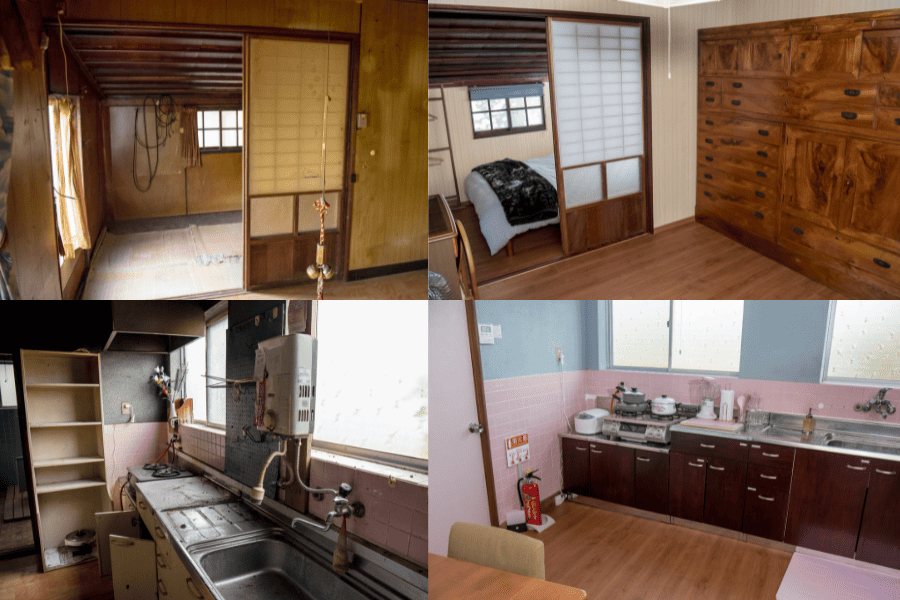
“We purchased directly from the son of the former owner, who is now in his 70s, and lives nearby. He has been quite pleased to see his childhood home come back to life.”
What renovations did you do? How long did the whole renovation process take and how much did it cost? Were there any unexpected costs?
Dani and Evan: Due to the Startup visa’s six month timeframe, the renovation of our first house was completed on a deadline. We needed to be able to demonstrate that the guesthouse would be a viable part of our growing business, and therefore host our first guests, before our first visa extension application! Thankfully, renovations were primarily cosmetic. The total cost was about US $19,000 to get this house to a comfortable and inviting living condition.
Since we were working against the clock, we hired a local contractor to help with some aspects, such as some minor electrical updates, installing a new kerosene water boiler, and other things that helped us with the time crunch.
The majority of the renovation was done by ourselves, learning as we went! It seemed like we had an endless list of little projects: after sorting all the left-behind belongings, there was of course deep-cleaning, re-staining all the beautiful wood, sealing up gaps and cracks, repairing all the sliding screens, including the shoji paper, and more deep-cleaning. Some bigger projects: we replaced the subfloor in two rooms, polished the existing stainless steel kitchen cupboards to a nice shine, rebuilt the cabinet doors, replaced some missing kitchen and bathroom tiles, and did a little work to stabilize the stairs.
We’re calling this “Phase One”. Future renovations will include adding a second bathroom, resurfacing the existing bathtub, and adding some color and shine to the ‘doma’ entrance room floor.
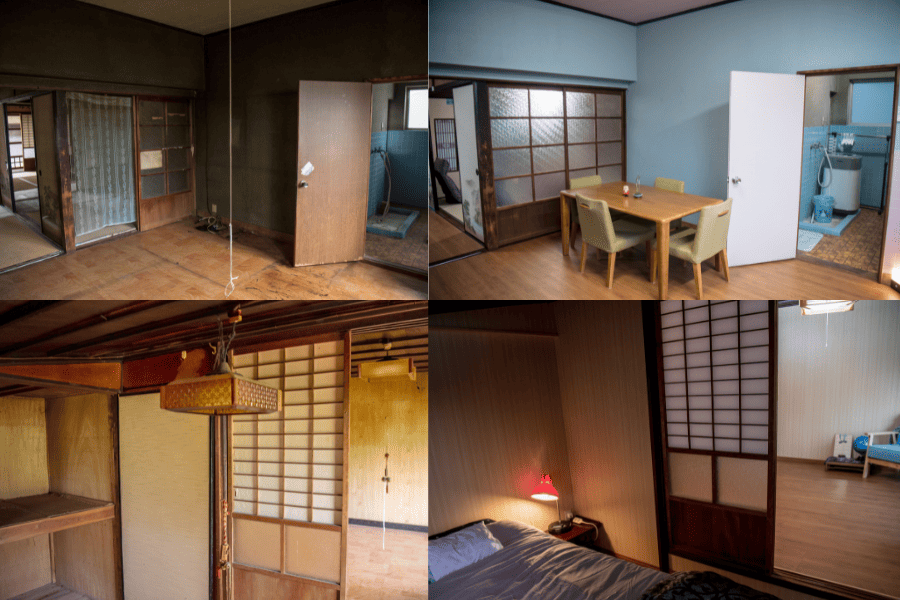
“It seemed like we had an endless list of little projects…”
If you could do it all again, what would you have done differently?
Dani and Evan: We definitely would’ve preferred to have more time to go through the renovation slower, to enjoy the process, and document it more thoroughly. That being said, we still have a lot of work ahead of us! We plan to take our sweet time renovating the second house, and are considering the possibility of hosting workshops, so others can learn too.
What has your experience been with Airbnb? What have been the biggest challenges and what are the biggest positives?
Dani and Evan: We had previously enjoyed operating an AirBnB on our urban farm in New Orleans, so we had a good idea of what to expect, and how to avoid certain pitfalls.
In addition to renovation costs, we spent about US $5,000 on home comforts, like furnishings, bedding, kitchen appliances, portable heaters, toiletries, and a Nintendo Famicom. My favorite part was figuring out how to furnish the house with as many of the original belongings as possible, and only supplementing with Showa-era thrift store treasures when necessary.
The rental license in Japan was fairly complicated, and since we were already very busy meeting the Startup visa requirements, we hired a scrivener to help us with the process. The fire requirements included some complicated additions: smoke detectors in every room, and exit signs that stay illuminated during a power outage, which of course had to be installed by a contractor. The total cost for the rental requirements and scrivener was also about US $5,000.
To save you from having to do the math, that means the total cost for purchasing our first akiya, and getting it ready for AirBnB, was about US $38,000.
Anything else that you’d like to share with Cheap Houses Japan readers?
Dani and Evan: When we first started dreaming of moving to Japan’s countryside, we found (as I’m sure many of your readers have) there are few resources. Honestly, reading the blog here on Cheap Houses Japan helped me to realize that it could be possible! Now that we’re here and making progress, I feel compelled to share every step of the way, through photo blogs, YouTube videos, and daily “stories”. We have a small group following our pages, but have already made many new friends who message regularly with encouragement, or updates about their own akiya. We get lots of questions, and I do my best to help point everyone in the right direction.
In the future, we hope to include educational resources, covering a wide variety of topics including homesteading, raising honeybees, testing various farming methods, and of course, immigration, incorporating a business in Japan, and akiya renovation. We hope to provide hands-on experience at some point, but for now, YouTube is our best option. Please feel free to get in touch, follow along with our little adventure, and come visit Ōmishima!
A big thank you to Dani and Evan Benton for sharing their story here. What do you think? Would you buy a house like them in Ōmishima island?
You can find more of Evan and Dani’s AirBnB and other projects here: Benton Homestead | YouTube | Instagram | Dani Benton Photography | Instagram.
Benton's House Photo Gallery
If you need inspiration to find your dream vacation house in Japan, follow Cheap Houses Japan on Instagram.
Looking for more advice about buying a house in Japan? Read this article I wrote:
